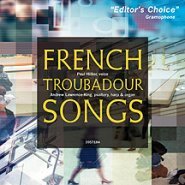Troubadours and trouvères - REPOST
Dante and the Troubadours Dante Alighieri (1265-1321), the author of the Divina Commedia, closely studied and imitated the troubadours (from Occitan "trobar" = to find). He also wrote a treatise on achieving poetic perfection in the vernacular, De Vulgari Eloquentia, wherein he expounds upon the qualities and characteristics of individual poets who lived several generations before his own time. The pieces provided on this release are all based upon the selections Dante made in his treatise.
Dante Alighieri (1265-1321), the author of the Divina Commedia, closely studied and imitated the troubadours (from Occitan "trobar" = to find). He also wrote a treatise on achieving poetic perfection in the vernacular, De Vulgari Eloquentia, wherein he expounds upon the qualities and characteristics of individual poets who lived several generations before his own time. The pieces provided on this release are all based upon the selections Dante made in his treatise.- Aimeric de Peguilhan (c.1175-1230): En amor trob alques enque'm refraing (voice, harp, fiddles). As a late and expatriate troubadour he helped keep the tradition alive by transplanting it to the new and fertile environment of Italy. This song abounds in poetical devices (e.g. rhyme on "Amor") and word-play, yet its high style and somewhat formal interlude points to a performance mode of a festive courtly entertainment.
- Arnaut Daniel (c.1180-1200): Lo ferm voler qu'el cor m'intra (voice). Dante's favourite poet of love, who was moreover placed in Purgatory for his lustfulness and sensuality. This song is an example of the sestet, a form that uses the same set of six words to end each of the six lines of each of the six strophes of the song.
- Bertran de Born (c.1140-1215): Rassa, tan creis e monta e pola (voice, fiddles, symphonia). Whereas track 2 deals with love, this one deals with war. Dante placed this poet in the Inferno for his warlike ways. The theme of strife is further pointed out by the two fiddlers combined with the robust voice of the warrior-singer.
- Peire d'Alvernhe (c.1150-1215): Dejosta'ls breus jorns e'lsloncs sers (voice). It is argued that this is the only melody attributed to Peire d'Alvernhe which has come down to us. It fluctuates between the dark and inward-looking and the light and hopeful. It should be noted that the whole is performed by a single unaccompanied voice.
- Guiraut de Bornelh (c.1138-1215): Non posc sofrir c'a la dolor (voice, fiddle). Guiraut was held to be the master of the troubadours by his contemporaries. This song recounts a dream, an alternate reality therefore, in which hopes and disappointments are more vivid than in daily life.
- Arnaut Daniel (fl. 1180-1200): Chanson do'ill mot son plan e prim (voice, fiddles, harp). Sent to Purgatory by Dante for lustfulness, and lauded by Ezra Pound for being the greatest poet who ever lived. This song shows how the troubadour worked to control the sentimentality potentially created by refined or courtly love.
- Folquet de Marseilla (c.1155-1231): Tant m'abellis l'amorospessamens (voice, harp). Allowed entry into Paradise for all eternity by Dante, Folquet changed to the strictly spiritual life, away from courtly pursuits, later in his life. The singer accompanies himself on a small romanesque harp.
- Improvisation on melodies of Folquet de Marseilla (fiddle, harp). This performance is brought into structural form according to the principles set out by Arnaut Daniel (see #6), and translated into the particular idiom of the medieval fiddle.
Pass=paxdiero.blogspot.com
French Troubadour Songs
 The northern French trouvères flourished somewhat later than the Provençal troubadours; initially they adopted thematic material from their southern confrères. The theme adopted most of all, having initially come from Arab poetry, was courtly love - a more accurate term, however, is fin'amor, perfect or refined love. The art of love is raised to an ethical standard, a code of conduct.
The northern French trouvères flourished somewhat later than the Provençal troubadours; initially they adopted thematic material from their southern confrères. The theme adopted most of all, having initially come from Arab poetry, was courtly love - a more accurate term, however, is fin'amor, perfect or refined love. The art of love is raised to an ethical standard, a code of conduct.This release is framed by two anonymous songs both light-hearted in tone. The first of these is an example of the reverdie, a genre native to northern France. The reverdie celebrates the arrival of springtime and the renewal of love. The second (track nine) is a pastourelle: a genre, though of troubadour origin, which was particularly favoured by the trouvères. It represents the seduction of a lady, usually a sheperdess, by a knight who does not hesitate to use force where persuasion fails. This genre is intended to entertain, but is often used as a vehicle for satire of the knightly class or even courly love itself.
Placed against these songs are the grands chants of Gace Brulé (tracks 2 & 8). The grand chant originated with the troubadours; it celebrates fin'amor in all its infinite variety. Gace Brulé was one of its foremost practitioners. Both songs bring into play the pain of inaccessible love and constancy of desire.
The next layer includes two songs by Moniot d'Arras and Colin Muset (tracks 3 & 7). Both exhibit the indeterminacy of genre characteristic of some trouvère songs, no longer courtly and reaching out for new forms of expression. Track 3 mixes themes from the pastourelle and the chanson de rencontre. In the latter a meeting occurs, but there is no thought of seduction. Track 7 bears resemblance to a reverdie in its springtime setting, to a fratrasie, a kind of nonsense song, and to a pastourelle.
At the center of the program (tracks 4, 5 & 6) are three songs by Thibaut de Champagne, one of the greatest trouvères. He was a direct descendant of the first known troubadour, William IX. Thibaut also took part in the Crusades. Track 4 has as its guiding image the unicorn, metaphor for the poet fatally attracted by a lady whose cruelty causes his death. Track 6 is a grand chant courtois, differing from the grand chant by the use of refrains. More often than not, this genre uses intertexuality by "borrowing" refrains from other songs, thus granting the singer greater flexibility and virtuosity. At the center of the program (track 5) is the only piece performed without instruments. It is a serventois, a political song, over which presides the image of the pelican, setting the theme of evil and salvation. It is a powerful critique of the Church, possibly an attack on Pope Gregory IX at the time of the prolongation of the sixth crusade (1236-39). The term "papelart" refers to religious hypocrites who lead into a hell from which only the Virgin can save mankind.
- Volez Vous Que Je Vous Chant (Would You Have Me Sing for You), Anonymous
- Les Oxelés de Mon Païx (The Birds from My Native Land), Gace Brulé (circa 1160 - circa 1212)
- Ce Fu en Mai (Once in the Month of May), Moniot d'Arras (fl.1213 - fl.1239)
- Ausi Conme Unicorne Sui (Like the Unicorn I Am Lost in Wonder), Thibaut King of Navarre (1201 - 1253)
- Deus Est Ensi Conme Li Pellicanz (The Lord Is Like a Pelican), Thibaut King of Navarre (1201 - 1253)
- Chançon Ferai, Que Talenz M'En Est Pris (I Will Fashion a Song), Thibaut King of Navarre (1201 - 1253)
- En Mai, Quant Li Rossignolez (In May, When Nightingales Sing Clear), Colin Muset (circa 1200 - 1250)
- A La Douçor de la Bele Seson (In the Fragrance of the New Season), Gace Brulé (circa 1160 - circa 1212)
- Quant Voi la Flor Nouvele (When I See Fresh Blooms Appear), Anonymous
IFNKOVHGROGHPRM (Part 2)
Sorry this one happens to be split: I must have made some error while rarring it. Nevertheless, enjoy!

7 Comments:
Dante and the Troubadours is een goeie actie om te posten. met name voor mijn oren. en nog beter de uitvoerende seqencia! creme de la creme!
gracias a vos!
Tsc. The previous guy could be sued for his comment 'bout flies. What harm can we, insignificant little winged cocoonlings, bring to u giant bypede humans?
Anyway... its nice u came back to business Pax.
Tsc. The previous guy could be sued for his comment 'bout flies. What harm can we, insignificant little winged cocoonlings, bring to u giant bypede humans?
Anyway... its nice u came back to business Pax.
can you repost Lisa Germano's Happiness album please...
millions thanks before!
Sorry about the delay. I had a really rough weekend, skipped sleep on friday night and went on a bit of a bender and have been trying to recover since... Gets harder as you get older, so I've noticed. But don't worry,I WILL post that Lisa Germano album - brings back really sweet memories, even though it's a rather sad album. Patience is once again the key...
3 cheers for grandpa pax :)
Hi, can you repost part 1 of the French troubadour Songs? It's 'temporaily unavailable'.
Post a Comment
<< Home